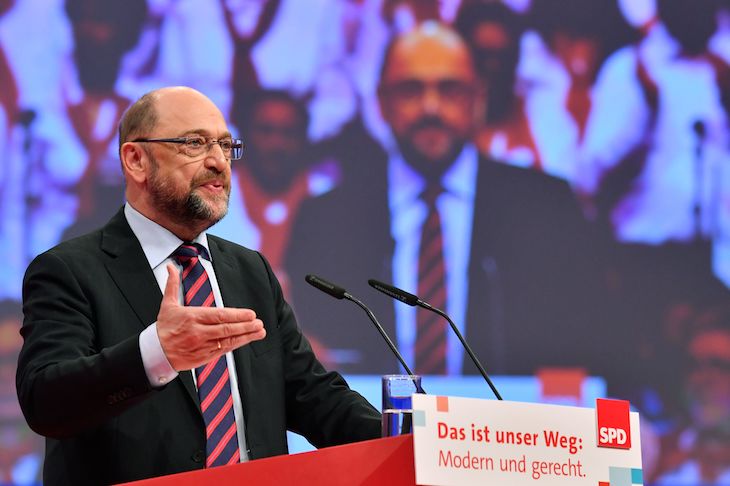Now Theresa May has made it through the first round of Brexit negotiations, a bigger question becomes more pressing: what sort of Europe will Britain be dealing with in next year’s trade talks – and beyond? The answer to this question came from Martin Schulz, leader of Germany’s Social Democrats, at this week’s SPD party conference, when he called for a United States of Europe by 2025. ‘The Europe we want does not exist right now – we need to create it,’ he declared. ‘Economic, cultural, social and political integration is the best protection against fascism, war and anti-democracy.’
That Schulz should be in favour of a federal Europe is no surprise. As President of the European Parliament until last year, he made no secret of his desire for ever closer European Union. However the timing of this speech is significant – and so is the tone. When he became SPD leader a year ago, the Social Democrats were becalmed on 22 per cent in the polls. With his down-to-earth, no-nonsense manner, Schulz was widely expected to improve dramatically on this dismal showing. Instead, in September’s election his SPD polled a mere 20.5 per cent, the party’s worst return since the war.
During that campaign Schulz devoted little time to Europe (clearly, party strategists had decided the topic was a turn-off for German voters) yet his focus on domestic matters didn’t garner any extra votes. Now he’s decided to stop apologising for Europe, and make his Europhilia his main selling point.
The SPD has spent the last four years as the junior partner in a Grand Coalition with Angela Merkel’s Christian Democrats, and has consequently lost votes to smaller parties – on the left and on the right. With his left wing credentials and his working class roots, at first Schulz looked like he might be the right man to win back these disenchanted voters. September’s election proved otherwise. His ‘United States of Europe’ speech shows he’s now more concerned about shoring up the party’s existing base.
In an interview with Deutsche Welle, on the conference floor, Schulz sought to temper the contents of his speech. Nation states like France and Germany would never become mere states, like California or Texas, he said. ‘National sovereignty is strong and will remain,’ he added. ‘To deepen transnational cooperation – that’s what I mean by the United States of Europe.’ Yet in his speech, he urged delegates to develop a passion for Europe. ‘People must realise that Europe can make a difference in their everyday lives.’
The SPD has been an effective coalition partner these last four years – and until a new coalition is formed it remains in office, alongside the CDU. But competence is not the main sticking point. The SPD’s biggest problem is that voters no longer know what it stands for. Schulz’s speech is a rebranding exercise, an affirmation that his SPD remains distinct and separate from Merkel’s Eurotepid CDU. ‘We Are Europe’ proclaimed the banners brandished by enthusiastic delegates on the conference floor. Such rampant Europhilia may alienate a lot of German voters, but it will give the party a clear identity – an identity it lost governing alongside the CDU.
Proclaiming 2025 as the target date for a United States of Europe is more symbolic than realistic, a landmark for SPD members rather than Germans as a whole. Way back in 1925, during the Weimar Republic, the SPD made a similar proposal, which is why Schulz has pegged his own policy to 2025. It’s a reminder to SPD supporters that theirs is a party with a long and illustrious history, not just a pliant partner for Merkel’s CDU.
This appeal to the party faithful, rather than the wider audience outside the conference hall, shows Schulz is gearing up to enter another Grand Coalition – despite all his previous protestations that he’d countenance no such thing. If he enters another coalition, there’ll be no new election (and no need to win over floating voters) but he knows many SPD members will be aghast. His ‘United States of Europe’ speech is aimed at reassuring SPD diehards that their party will fight to implement a radical agenda of its own.
Schulz is determined to drive a hard bargain with Merkel, and he’s well placed to do so. Despite his wretched performance in September’s election, he’s in a much stronger position now than he was before. Despite emerging as the largest party, Merkel’s CDU also performed poorly in the election, down to 33 per cent (their worst showing for half a century) and the collapse of coalition talks between her CDU, the Greens and the Free Democrats leaves Schulz’s SPD as the only party who can give her a working majority. Her only other options are a minority government or another election, and both these options are fraught with danger. For Merkel, a coalition with the SPD is now the only show in town.
Schulz will be a big player in German and European politics throughout the Brexit process. For him, Brexit isn’t a setback so much as an opportunity. With Britain putting on the brakes, the EU juggernaut was never going to travel in the direction that he wanted – towards a unified fiscal strategy and a single foreign policy, a United States of Europe in all but name. At first, Eurocrats were fearful that other EU members would follow Britain out of the EU. Now Schulz has dared them to do so, if they’re not willing to converge. Rather than retaining members at all costs in a wider, shallower Europe, Martin Schulz favours a deeper (and, if necessary, smaller) EU. And by 2025 he may well get it.






Comments